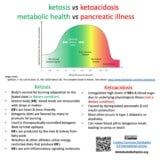My mother’s suffering spurred me to find keto
Christie Barnett’s keto journey:
Sitting in a nursing home with my dying mother is where it all began for me, Christie Barnett. There she was, a 71-year-old formerly dignified college instructor, stuck in a wheelchair, sitting in a diaper.
My mom’s final chapter
She had a stroke at age 70 and was diagnosed with resultant vascular dementia at age 71. The stage for all this was set at age 65 when she developed type 2 diabetes. She had a lifelong fight with obesity and it finally won. She suffered the stigmatizing shame of the fat. I blamed her. I thought, “You’re fat and sedentary, what do you expect?” when I heard about her diabetes. I’m a nurse, so I should have known better. But that’s what I was taught. Many, if not most, health care providers maintain this perspective (even the ones who are themselves fat!). It’s a mindset that is part of both our education and the societal shame process. Here is a moving TED talk by Peter Attia, MD that explores this issue sensitively.
Back to my mother, she died, disoriented, demented, and incontinent at age 71, having lost all the dignity that was so important to her.
Finding out I was pre-diabetic
Fast forward to my annual physical at age 53. My A1c was 5.8 which made me pre-diabetic. Oh, and despite working out 5 or more days a week and being on a “healthy” low-fat vegetarian diet, I was fat. Obese actually. I was ashamed I was so fat. Not to worry though, as my doctor, a lovely smart woman, said my A1c wasn’t so bad. “We don’t usually intervene until it reaches 6.” I apparently wasn’t pre-diabetic enough for treatment. I didn’t think that was a sound plan.
Testing what worked for me – reducing carbohydrates
Doing something to reverse my pre-diabetes seemed like a better idea. After hearing from my doctor that no intervention was recommended for me at this point, I realized I was going to have to save myself, and I did. I researched what to do because I couldn’t count on my doctor for guidance. I found that reducing my carbohydrate intake would be key to reversing my pre-diabetes. This is because carbohydrate is the main macro nutrient which causes blood sugar to elevate. I decided to buy and use a glucometer to measure the effect of various foods on my blood glucose. Many of my “healthy” whole grains and fruits sent my blood glucose into the 150s, not an ideal level. I decided not to eat them, or any starch or sugar. Slowly I lowered carbohydrates until I reached the macro composition of a ketogenic diet.
Christie Barnett, APN – After 6+ years keto
After being on a ketogenic diet for 6+ years, my A1c is now a normal 5.1. I lost 50 pounds, without deprivation, tracking or hunger. My weight has been steady for 5 years. I now have an “off” switch with eating, something I never had before. No longer am I preoccupied with my next meal. I never get “hangry” as my body’s fuel is steady in both fed and fasted states. I don’t think I’ll develop diabetes. Hopefully, I’ll outlive my mother and help others avoid her fate and her shame. I hope I can integrate all I’ve learned into my nursing practice. Keto gave me hope.
More success stories from the Metabolic Multiplier team
- Captain Malagon –
- Cecile‘s
Other resource guides & toolkits you might value
Curious about improving metabolic health with lifestyle?
- Lifestyle Medicine, the key to metabolic healing
- What is metabolic health? A layperson’s definition and a biochemist’s perspective
Where do I start improving my metabolic health?
- Your patient toolkit for prediabetes & type 2 diabetes
- What to eat? Get clever! Clinicians’ flexible approach to tailoring carb reduction to you.
- Want more detail on carbohydrate reduction? A round-up of quality, what-to-eat guides from around the web
- Best resources for an overview of keto – Metabolic Multiplier’s round up of the best resources we’ve found by evidence-based organizations & clinicians. For patients, families & caregivers.
- Keto doctors near me – over 20 directories of low-carb professionals
For clinicians using therapeutic carbohydrate reduction (TCR), ketogenic diet therapies (KDT)
- Best Keto resources for clinicians & other practitioners
- How to build my ketogenic therapy treatment team – Support for the more complex cases.
- Why write medical case reports about unique cases? – Our round up can save you time.
For colleagues interested in amplifying metabolic health
- Overview schematics help us think about metabolic health – Understand our Organizing Research team‘s thinking behind these 3 metabolic health research portals
- Communication guide to unite advocacy for metabolic health – Suggested language metabolic health advocacy. Principles. Language to use or avoid. Food & lifestyle first.
- Style Guide to unite advocacy for metabolic health – Welcome new team members! Many of you encourage using one voice for metabolic health. Below are suggestions from your fellow clinicians, scientists and professionals. See our Communication Guide as well. We’d love to hear…
- What Foundations support Metabolic Health? Charities, advocacy & grassroots groups using metabolic interventions & health to treat metabolic conditions.











